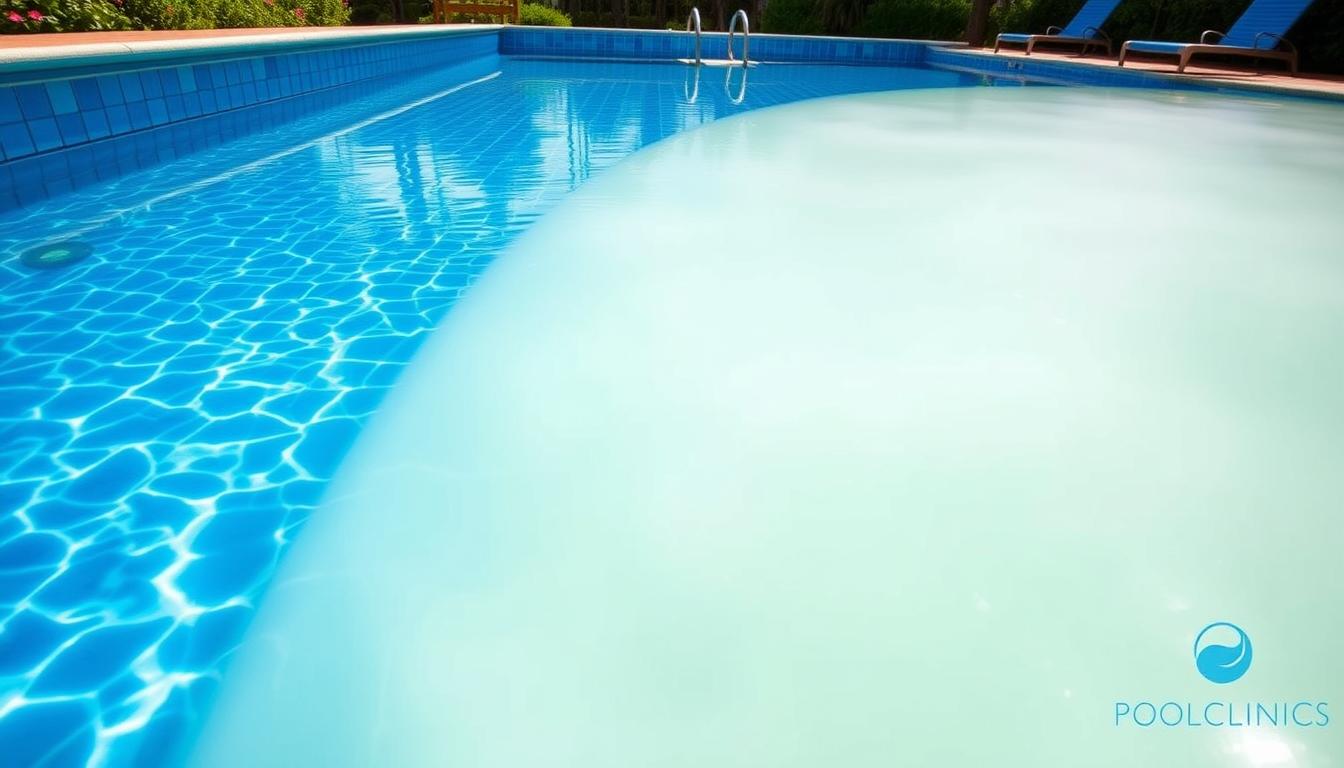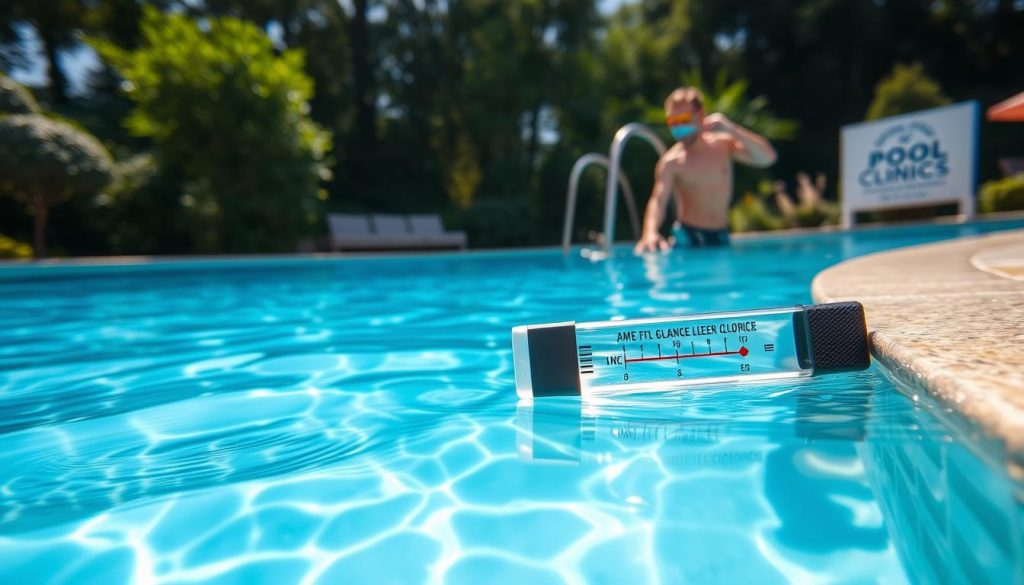
Pool owners often question if excess chlorine causes cloudy water. Proper chlorination is vital for a clean, safe swimming environment. However, the link between chlorine and cloudiness isn’t always clear-cut.
We’ll explore factors that affect pool chemistry imbalance. You’ll also learn essential pool maintenance tips to keep your water crystal clear.
Cloudy pool water can stem from various sources. These include unbalanced chemicals, poor filtration, and algae growth. High chlorine alone may not directly cause cloudiness.
However, it can upset your pool’s delicate chemical balance. Understanding how chlorine interacts with pH and alkalinity is crucial for a sparkling pool.
Key Takeaways
- Excessive chlorine levels can disrupt pool chemistry balance, potentially leading to cloudy water
- Factors such as high pH, alkalinity, and calcium hardness also contribute to cloudiness
- Regular monitoring of chemical levels and proper filtration are essential for maintaining clear pool water
- Shocking the pool and using algaecide can help address algae growth and restore clarity
- Consulting with pool professionals can provide targeted solutions for addressing cloudy water efficiently
The Relationship Between Chlorine Levels and Pool Cloudiness
Chlorine plays a vital role in pool sanitization. It keeps pools free from harmful bacteria and contaminants. However, an imbalance in chlorine levels can cause cloudy water.
Understanding Free Chlorine and Total Chlorine
Free chlorine actively sanitizes pool water. Total chlorine includes both free chlorine and combined chlorine, known as chloramines.
| Chlorine Type | Description | Ideal Range (ppm) |
|---|---|---|
| Free Chlorine | Active form of chlorine that sanitizes the water | 1-3 |
| Total Chlorine | Sum of free chlorine and combined chlorine (chloramines) | 1-3 (same as free chlorine) |
High total chlorine with low free chlorine indicates excessive chloramines. This situation makes the water cloudy and less sanitary. To fix this, shock the pool to eliminate chloramines.
Shocking restores the balance between free and total chlorine. This process helps clear cloudy pool water effectively.

The Impact of Chloramines on Water Clarity
Chloramines form when free chlorine mixes with sweat and urine. They are less effective at keeping water clear than free chlorine. Chloramines can irritate eyes and skin, causing the typical “chlorine smell”.
To prevent chloramines, maintain proper pool hygiene. Encourage swimmers to shower before entering the pool. Regularly shock the pool to break down chloramines.
These steps help combat chlorine overdose in pools. They ensure optimal water clarity and safety for all swimmers.
Other Factors Contributing to Cloudy Pool Water
Chlorine levels are crucial for pool water clarity. However, other factors can also cause cloudiness. These include pH, alkalinity, calcium hardness, algae growth, and filtration issues.
Imbalanced pH, Total Alkalinity, and Calcium Hardness
Proper balance of pH, alkalinity, and calcium hardness prevents cloudy pool water. High levels can cause calcium to precipitate, making water cloudy. A pH above 7.8 can contribute to this issue.
Regular testing and adjusting these parameters is essential. This helps maintain water clarity within recommended ranges.
| Parameter | Ideal Range | Effect on Water Clarity |
|---|---|---|
| pH | 7.2 – 7.6 | High pH can cause calcium precipitation and cloudiness |
| Total Alkalinity | 80 – 120 ppm | High total alkalinity can lead to calcium scaling and cloudy water |
| Calcium Hardness | 200 – 400 ppm | Excessive calcium hardness can result in cloudy water and scale formation |
Algae Growth and Its Effects on Water Clarity
Algae growth often causes cloudy pool water. It can give water a green, murky appearance. This happens when free chlorine is low or cyanuric acid levels are high.
To fight algae, maintain adequate free chlorine levels. Regularly brush pool surfaces and use algaecide when needed.
Filtration Issues and Their Role in Cloudy Water
Filtration problems can lead to cloudy pool water. A clogged filter prevents proper water circulation. This allows debris to accumulate, causing cloudiness and reducing chlorine effectiveness.
Monitor filter performance by checking back pressure. Clean the filter when needed. Regularly backwash the system and ensure sufficient run time.
Address these factors alongside chlorine levels for clear pool water. Regular testing, adjusting chemistry, and proper filtration will keep your pool inviting all summer.
Addressing Cloudy Pool Water Caused by Chlorine Imbalance
Proper pool chemical safety is key for clear water and healthy swimming. Imbalanced chlorine levels can cause cloudy water. Let’s explore how too much chlorine affects water balance and clarity.
Excessive Chlorinating Chemicals and Their Impact on Water Balance
Too much chlorine can make pool water cloudy. It disrupts water balance, affecting pH, alkalinity, and calcium hardness. This can irritate swimmers’ skin and eyes.
- pH: 7.2 to 7.8
- Alkalinity: 80 to 120 ppm
- Calcium Hardness: 200 to 400 ppm
- Free Chlorine: 1 to 3 ppm
Monitor and adjust these levels to prevent cloudiness. This will keep your pool water balanced and clear.
Temporary Cloudiness After Shocking the Pool
Pool shocking eliminates contaminants and maintains sanitizer levels. It may cause temporary cloudiness due to sudden water balance changes. Cold water can slow granule dissolution.
Usually, cloudiness clears up in 24 to 48 hours. Chemicals dissipate and water temperature rises. To reduce prolonged cloudiness, try these tips:
- Always follow the manufacturer’s instructions for dosage and application.
- Ensure the pool water is properly balanced before shocking.
- Run the pool pump and filter continuously for at least 24 hours after shocking to help distribute the chemicals evenly and filter out any debris.
- Brush the pool walls and floor to help the shock treatment work more effectively.
Maintain proper water balance and follow shock treatment procedures. This helps prevent and quickly resolve temporary cloudiness from chlorine-based pool shock products.
Conclusion
Keeping a crystal-clear pool requires diligent maintenance and understanding of water clarity factors. High chlorine levels aren’t always the main cause of cloudy water. Imbalanced pH, alkalinity, and calcium hardness can also lead to murky water.
Regular testing and adjusting of chemical levels is crucial for a balanced pool chemistry. Proper filtration is equally important for removing debris and maintaining clarity. Clean and maintain your filtration system regularly for best results.
Environmental factors like runoff water can impact water clarity. Use enzyme products and maintain proper cyanuric acid levels to prevent chlorine depletion. A comprehensive maintenance schedule helps ensure crystal-clear water throughout the swimming season.
Achieving a clear, inviting pool requires a proactive approach to water cloudiness factors. By understanding chlorine levels, chemical balance, and filtration, you can keep your pool enjoyable. With proper care, your pool will remain a relaxing oasis for you and your family.







